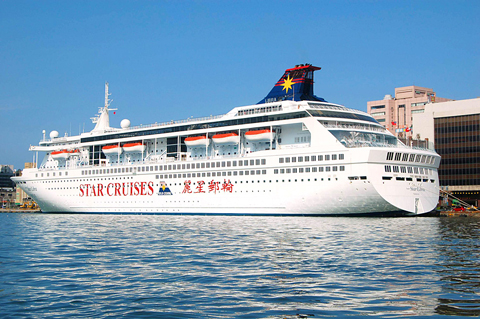Star Cruises (麗星郵輪), the largest cruise line in the Asia-Pacific, said yesterday that it may consider withdrawing from the Taiwanese market if Taiwanese authorities deny its application to operate a direct cruise service between the northeastern port of Keelung and Xiamen, Fujian Province.
Star Cruises filed the application with the Keelung Harbor Bureau last month to serve the route, but the screening process has turned out to be a frustrating experience for the company, as government officials and the cruise line’s executives disagree over the nature of the service.
Ministry of Transportation and Communication officials said that regular cruises between Keelung and Xiamen would amount to marine passenger services, which only Taiwanese vessels or vessels owned by Taiwanese-Chinese joint ventures are allowed to operate under local regulations.

PHOTO: LU HSIEN-HSIU, TAIPEI TIMES
The Hong Kong-based Star Cruises said, however, that ordinary people are unlikely to use expensive cruises as “passenger services.”
Transportation officials have suggested that Star Cruises add another destination to the line to make the operations look more like a cruise than a ferry service.
Star Cruises has yet to decide whether the suggestion is acceptable, but sources at the company said an initial evaluation has shown that the proposed change would be much less attractive than the originally planned route.
The sources said that Star Cruises has already reduced its workforce in Taiwan by 70 percent amid the global economic downturn. The company was to close its operations in Taiwan early last year, but delayed the action after seeing a glimmer of hope in proposed cross-Taiwan Strait talks on direct shipping between Taiwan and China.
Star Cruises entered Taiwan’s maritime tourism market in 1997, sailing primarily between Keelung and Japan’s Okinawa. The cruise line stopped sailing this route in October 2005, but resumed the service in June 2007.
The company has been the major player in Taiwan’s cruise market, taking local tourists on cruises to the Japanese islands of Okinawa, Ishigaki and Yonaguri, Taiwan’s Penghu islands and Hong Kong. When the weather turns cold, its ships leave Taiwan to serve Star Cruises’ other Asian routes.
At the time when Star Cruises resumed homeporting in Keelung, Star Cruises’ Taiwan manager Andy Lew (盧冠群) openly indicated that from a long-term point of view, Star Cruises wanted to launch services from Taiwan to Shanghai and Xiamen — two of China’s port cities.
Taiwan and China reached agreements in November to lift a six-decade ban on direct sea and postal links between the two sides and expand air links.
Foreign cruise ships visiting Taiwan now no longer need to sail to a third territory, usually Hong Kong, before they can visit a Chinese port, or vice versa.
If Star Cruises terminates its operations in Taiwan, the port of Keelung will lose at least NT$7 million in harbor fees a year from its home port, and tourism-related businesses will lose revenues from tourists who dock at Keelung on 80 cruises between March and September every year.

PROTECTION: The investigation, which takes aim at exporters such as Canada, Germany and Brazil, came days after Trump unveiled tariff hikes on steel and aluminum products US President Donald Trump on Saturday ordered a probe into potential tariffs on lumber imports — a move threatening to stoke trade tensions — while also pushing for a domestic supply boost. Trump signed an executive order instructing US Secretary of Commerce Howard Lutnick to begin an investigation “to determine the effects on the national security of imports of timber, lumber and their derivative products.” The study might result in new tariffs being imposed, which would pile on top of existing levies. The investigation takes aim at exporters like Canada, Germany and Brazil, with White House officials earlier accusing these economies of

Teleperformance SE, the largest call-center operator in the world, is rolling out an artificial intelligence (AI) system that softens English-speaking Indian workers’ accents in real time in a move the company claims would make them more understandable. The technology, called accent translation, coupled with background noise cancelation, is being deployed in call centers in India, where workers provide customer support to some of Teleperformance’s international clients. The company provides outsourced customer support and content moderation to global companies including Apple Inc, ByteDance Ltd’s (字節跳動) TikTok and Samsung Electronics Co Ltd. “When you have an Indian agent on the line, sometimes it’s hard

‘SACRED MOUNTAIN’: The chipmaker can form joint ventures abroad, except in China, but like other firms, it needs government approval for large investments Taiwan Semiconductor Manufacturing Co (TSMC, 台積電) needs government permission for any overseas joint ventures (JVs), but there are no restrictions on making the most advanced chips overseas other than for China, Minister of Economic Affairs J.W. Kuo (郭智輝) said yesterday. US media have said that TSMC, the world’s largest contract chipmaker and a major supplier to companies such as Apple Inc and Nvidia Corp, has been in talks for a stake in Intel Corp. Neither company has confirmed the talks, but US President Donald Trump has accused Taiwan of taking away the US’ semiconductor business and said he wants the industry back

PROBE CONTINUES: Those accused falsely represented that the chips would not be transferred to a person other than the authorized end users, court papers said Singapore charged three men with fraud in a case local media have linked to the movement of Nvidia’s advanced chips from the city-state to Chinese artificial intelligence (AI) firm DeepSeek (深度求索). The US is investigating if DeepSeek, the Chinese company whose AI model’s performance rocked the tech world in January, has been using US chips that are not allowed to be shipped to China, Reuters reported earlier. The Singapore case is part of a broader police investigation of 22 individuals and companies suspected of false representation, amid concerns that organized AI chip smuggling to China has been tracked out of nations such